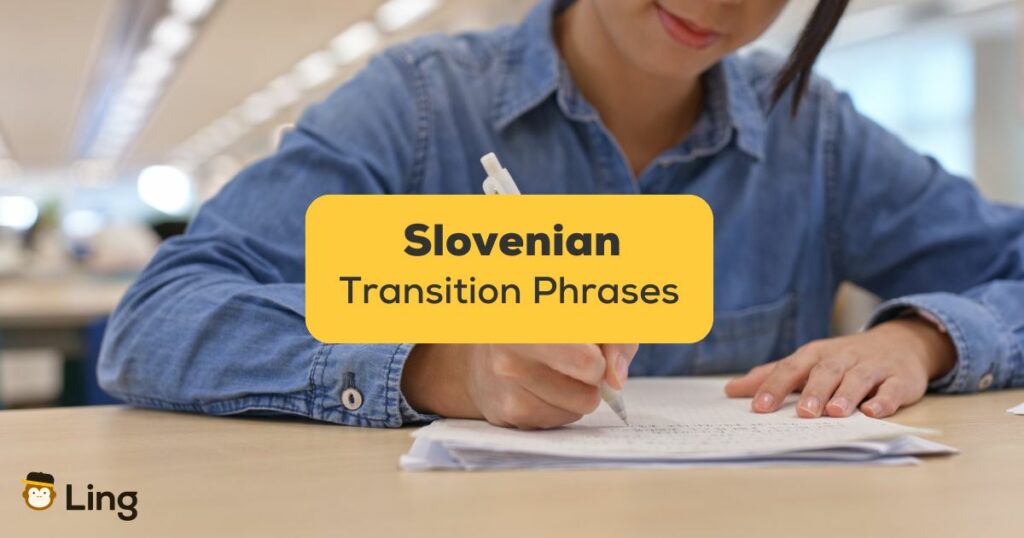Do you know what are transition phrases or words? So, whenever you’re reading something, you might notice some words or phrases that are used to connect ideas and sentences together. These are called transition phrases!
Like in any other language, there are lots of transition phrases in Slovenian. As language learners, it’s super useful to have vocabulary to understand them, because it will make reading Slovenian texts easier. So, let’s find out what they are!
Table Of Contents
Learning Transition Phrases In Slovenian
If you’re not sure what transition phrases are, let me explain – transition phrases in English are phrases like ‘furthermore,’ ‘in addition,’ ‘moreover,’ ‘therefore,’ etc. Some can be used in formal writing and essays, but their main purpose is to signal shifts in thought, introduce new ideas, provide examples, contrast information, or draw conclusions.
Same goes for Slovenian. Transition phrases in Slovenian are like guideposts that help conversations and writings flow smoothly. Whether you’re chatting or writing, knowing these phrases well makes communication clear and easy. Let’s explore some key Slovenian transition phrases with simple examples to understand how to use them.
For Example – Na Primer
Let’s start with the first sentence, and it’s an easy one. When you’re talking about a certain topic, and want to provide examples for the topic in Slovenian you would say na primer.
| English | Slovenian |
|---|---|
| For example, dogs are great pets. | Na primer, psi so odlični hišni ljubljenčki. |
Moreover – Poleg Tega
The Slovenian transition phrase poleg tega is like saying ‘moreover’ or ‘furthermore,’ but its translation is actually ‘besides that.’ You can use it when you want to add more information to what you just said. Here’s an example sentence:
| English | Slovenian |
|---|---|
| I enjoy playing basketball. Moreover, I also like to swim. | Rad igram košarko. Poleg tega mi je všeč tudi plavanje. |
In Short – Skratka
You can say skratka when you’re trying to sum up something you just said, or to conclude your point briefly. It’s kind of the equivalent of ‘to sum up,’ but it can more or less be used in conversational language, not in writing.
| English | Slovenian |
|---|---|
| The movie was boring and too long. In short, I wouldn’t recommend it. | Film je bil dolgočasen in predolg. Skratka, ne priporočam. |
On The Other Hand – Po Drugi Strani
When you want to talk about something different or opposite to what you just said, you can use Po drugi strani.
| English | Slovenian |
|---|---|
| I like sunny days. On the other hand, sometimes I prefer rainy days. | Všeč so mi sončni dnevi. Po drugi strani pa imam včasih rajši deževne dni. |

However – Vendar
When you want to say something different or something that contradicts the last sentence, you can use vendar.
| English | Slovenian |
|---|---|
| I like dogs, however I’m allergic to them. | Všeč so mi psi, vendar sem alergičen na njih. |
Because Of That – Zaradi Tega
When you want to say why something happened or will happen, you can use zaradi tega.
| English | Slovenian |
|---|---|
| The store is closed. Because of that, we’ll have to go shopping tomorrow. | Trgovina je zaprta. Zaradi tega moramo po nakupih jutri. |
Therefore – Zato
When you want to say what will happen because of something else, you can use zato. This word is similar to the phrase zaradi tega, and tells us the consequence of something.
| English | Slovenian |
|---|---|
| It’s raining, therefore, we will stay inside. | Dežuje, zato bomo ostali noter. |
Despite That – Kljub Temu
When you want to do something even though something else is happening, you can use kljub temu.
| English | Slovenian |
|---|---|
| It’s raining. I’ll go for a walk despite that. | Dežuje. Kljub temu bom šel na sprehod. |
Otherwise – Sicer
When you want to say what could happen if something else doesn’t happen, you can use sicer.
| English | Slovenian |
|---|---|
| Take an umbrella, otherwise you’ll get wet. | Vzemi dežnik, sicer boš moker. |
How Do You Say ‘Transition Phrase’ In Slovenian?
The translation of ‘transition phrases’ in Slovenian would be prehodne besedne zveze. They can more accurately be called povezovalne besede, which means connecting words, and shows their role in a sentence more clearly.
Useful Slovenian Vocabulary
Learning Slovenian grammar and useful vocabulary will help you greatly on your language-learning journey. If you’re looking for a fun way to learn Slovenian, the Ling app offers easy and fun lessons in this language, where you can start slow and grow your knowledge every day. In the meantime, here are some useful words that you can learn from, related to grammar and transition phrases in Slovenian.
| English | Slovenian |
|---|---|
| Word | Beseda |
| Sentence | Poved |
| Phrase | Fraza |
| Noun | Samostalnik |
| Verb | Glagol |
| Adjective | Pridevnik |
| Adverb | Prislov |
| Pronoun | Zaimek |
| Preposition | Predlog |
Frequently Asked Questions About Learning Slovenian
How Difficult Is It To Learn Slovenian On Your Own?
Learning Slovenian on your own can be a bit challenging, but it’s definitely doable with dedication and the right resources. The language has hard grammar rules, including cases and verb conjugations, which might take some time to grasp.
There are plenty of resources available online, such as language learning apps. If you practice speaking and listening, you can do wonders for your fluency. It will take some effort, but if you manage to learn it on your own, that’ll be even more rewarding, so stay motivated and consistent in your studies!
What Is The Closest Language To Slovenian?
The closest languages to Slovenian are Croatian, Serbian, Bosnian, and Montenegrin. They’re all part of a group called South Slavic languages. Their grammar rules are all pretty much the same. They also have similar words and sounds because they come from the same family. So if you know Slovenian, you might find it easier to understand and talk with people who speak these other languages too.
What Are Common Phrases In Slovenian?
Common Slovenian phrases are greetings like dober dan (good day), dober večer (good evening), and živjo (hi).
When you want to say thank you in Slovenian, you can use hvala or hvala lepa.
When you want to ask how are you in Slovenian, you can say kako si? And to respond, you can say dobro (good) or super (great).
For saying goodbye in Slovenian, you can use nasvidenje (goodbye) or adijo (bye).
All of these phrases are common and used in everyday conversations.

Mastering Slovenian Conversations With Transition Phrases
Today, you’ve taken yet another step towards your fluency in the Slovenian language. Congrats!
Transition words are like the glue that holds Slovenian conversations together. They’ll help your sentences flow smoothly and make your points crystal clear. So, don’t be afraid to dive in and start using them. And keep a lookout for these words next time you’re reading some Slovenian books. With a bit of practice, you’ll be weaving transitional words into your Slovenian conversations like a pro!































































